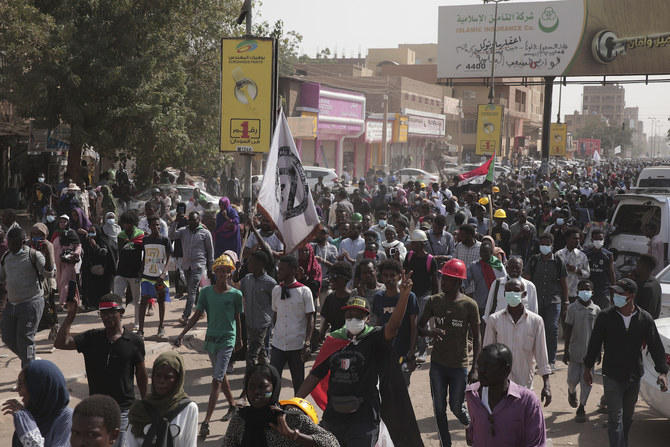KHARTOUM: Sudanese anti-coup protesters stabbed to death a police general on Thursday, authorities said, as thousands who kept up rallies against an October military coup faced tear gas.
Brig. Gen. Ali Bareema Hamad, “fell martyr while doing his duties and securing protests” in the capital Khartoum, a police statement said on Facebook.
Hamad “received deadly stabs by groups of protesters ... in different parts of his body,” police spokesman Idris Abdalla Idris told Sudan TV.
Other police personnel “suffered severe wounds,” he added.
Hamad’s was the first fatality announced among security forces since protests calling for a return to civilian rule began more than two months ago.
A security crackdown has left at least 63 people dead and hundreds wounded, according to medics, who said many of the protesters were killed by live rounds.
Thursday’s rallies converged from several parts of Khartoum and came after a United Nations bid to facilitate talks between rival Sudanese factions received tepid support.
The UN push aimed at resolving the crisis since the October 25 military coup led by General Abdel Fattah Al-Burhan, and the resignation of the civilian prime minister Abdalla Hamdok earlier this month.
Sudan has no government, foreign aid has been suspended, and regular demonstrations against the coup — attended by up to tens of thousands — are routinely met by a violent response from authorities.
Demonstrators also took to the streets in the capital’s twin city of Omdurman as well as in Port Sudan in the country’s east, according to witnesses.
Protesters in Khartoum converged on the city center chanting: “With all our power, we are heading to the palace.”
Following a repeated pattern, security forces fired volleys of tear gas to disperse the protesters in Khartoum and Omdurman, witnesses said.
Online footage appeared to show demonstrators hurling stones and unexploded canisters of tear gas at security forces near the presidential palace.
The military takeover derailed a fragile transition to civilian rule following Omar Al-Bashir’s ouster.
Authorities have repeatedly denied using live ammunition in confronting protesters and insist scores of security forces have been wounded during demonstrations that have often “deviated from peacefulness.”
On Monday, UN special representative Volker Perthes said he was launching “consultations” with political and social actors as well as armed and civil society groups.
The UN push has received a mixed response.
“We don’t accept this initiative at all,” 62-year-old protester Awad Saleh said.
“It’s not clear what points it constitutes and so for us it is deficient.”
The Sudanese Professionals Association, an independent trade union confederation instrumental in organizing the protests, said it completely rejects the UN initiative.
The mainstream faction of the Forces for Freedom and Change, the leading civilian pro-democracy group, said it will “discuss” the invitation internally before announcing its stand.
But spokesman Wagdy Saleh said the FFC rejected “any partnership” with the military.
The ruling Sovereign Council — formed by Burhan following the coup with himself as chairman — has welcomed the proposed talks, as have the United States, Britain, the UAE, Saudi Arabia and Egypt.
On Wednesday, Egyptian President Abdel Fattah El-Sisi called for stability in Sudan saying it “will not be reached except by consensus among all forces.”
Burhan has insisted that the military takeover “was not a coup” but only meant to “rectify the course of the Sudanese transition.
Hamdok resigned as prime minister on January 2, only six weeks after being reinstated following his house arrest in the wake of the coup.
In his resignation speech, Hamdok warned that Sudan was now at a “dangerous crossroads threatening its very survival.”
















